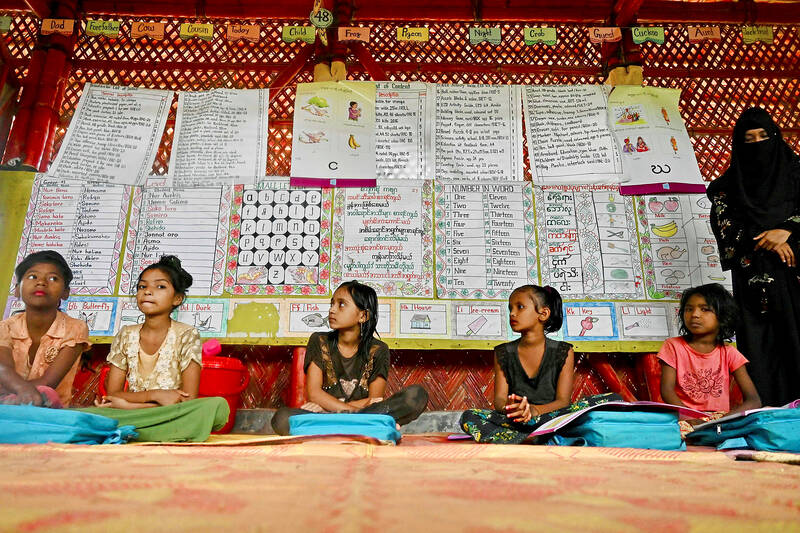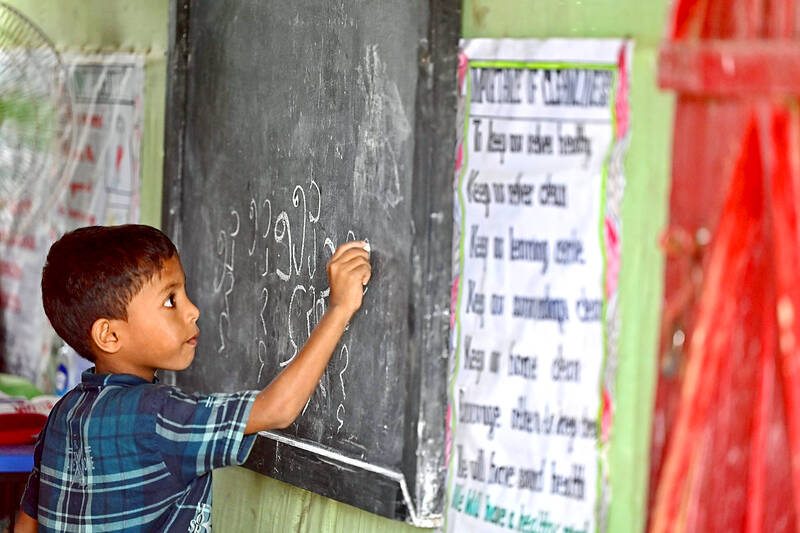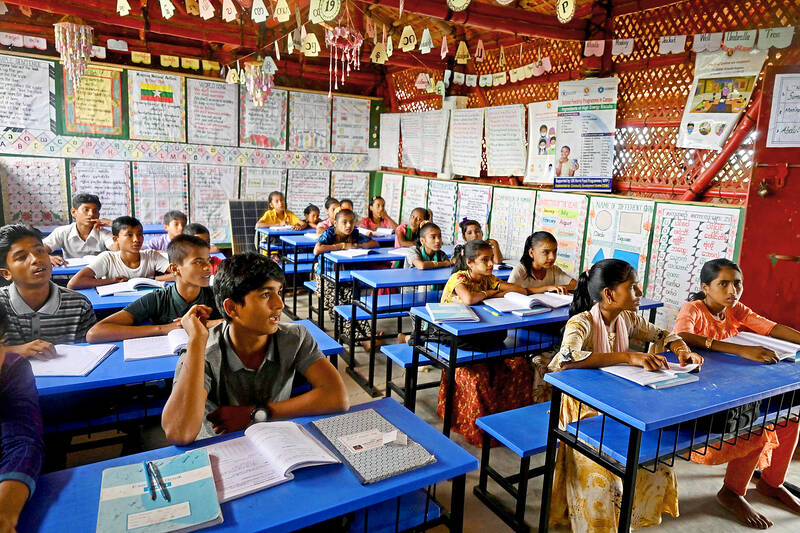Every morning in his refugee camp school, Mohammad Yusuf sings the national anthem of Myanmar, the country whose army forced his family to flee and is accused of killing thousands of his people.
Yusuf, now 15, is one of hundreds of thousands of mostly Muslim ethnic Rohingya who escaped into Bangladesh after the Myanmar military launched a brutal offensive five years ago on Thursday. For nearly half a decade, he and the vast numbers of other refugee children in the network of squalid camps received little or no schooling, with Dhaka fearing that education would represent an acceptance that the Rohingya were not going home any time soon.
That hope seems more distant than ever since the military coup in Myanmar last year, and last month authorities finally allowed UNICEF to scale up its schools program to cover 130,000 children, and eventually all of those in the camps.

Photo: AFP
But the host country still wants the refugees to go back: tuition is in Burmese and the schools follow the Myanmar curriculum, also singing the country’s national anthem before classes start each day.
The Rohingya have long been seen as reviled foreigners by some in Myanmar, a largely Buddhist country whose government is being accused in the UN’s top court of trying to wipe out the people, but Yusuf embraces the song, seeing it as a symbol of defiance and a future return.
“Myanmar is my homeland,” he said. “The country did no harm to us. Its powerful people did. My young sister died there. Our people were slaughtered. “Still it is my country and I will love it till the end,” Yusuf said.

Photo: AFP
TICKING BOMBS
The denial of education for years is a powerful symbol of Bangladesh’s ambivalence towards the refugee presence, some of whom have been relocated to a remote, flood-prone and previously uninhabited island.
“This curricula reminds them they belong to Myanmar where they will go back some day,” deputy refugee commissioner Shamsud Douza said.

Photo: AFP
But when that might happen remains unclear, and visiting UN human rights chief Michelle Bachelet said this month that conditions were “not right for returns.”
Repatriation could only happen “when safe and sustainable conditions exist in Myanmar,” she added.
She dismissed the suggestion that the Rohingya camps could become a “new Gaza,” but Dhaka is now increasingly aware of the risks that a large, long-term and deprived refugee population could present.
Around 50 percent of the almost one million people in the camps are under 18.
The government “thought educating the Rohingya would give a signal to Myanmar that (Bangladesh) would eventually absorb the Muslim minority”, said Mahfuzur Rahman, a former Bangladeshi general who was in office during the exodus.
Now Dhaka has “realized” it needs a longer-term plan, he said, not least because of the risk of having a generation of young men with no education in the camps.
Already security in the camps is a major problem due to the presence of criminal gangs smuggling amphetamines across the border. In the last five years there have been more than 100 murders.
Armed insurgent groups also operate. They have gunned down dozens of community leaders and are always on the lookout for bored young men.
Young people with no prospects — they are not allowed to leave the camps — also provide rich pickings for human traffickers who promise a boat ride leading to a better life elsewhere.
All the children “could be ticking time bombs,” Rahman said. “Growing up in a camp without education, hope and dreams; what monsters they may turn into, we don’t know.”
LOST YEARS
Fears remain over whether Bangladesh may change its mind and shut down the schooling project, as it did with a program for private schools to teach more than 30,000 children in the camps earlier this year.
Some activists condemn the education program for its insistence on following the Myanmar curriculum, rather than that of Bangladesh. With few prospects of return, the Myanmar curriculum was of little use, said Mojib Ullah, a Rohingya diaspora leader now in Australia.
“If we don’t go back to our home, why do we need to study in Burmese? It will be sheer waste of time — a kind of collective suicide. Already we lost five years. We need international curricula in English,” he said.
Young Yusuf’s ambitions also have an international dimension, and in his tarpaulin-roofed classroom he read a book on the Wright brothers.
He wants to become an aeronautical engineer or a pilot, and one day fly into Myanmar’s commercial hub Yangon.
“Someday I will fly around the globe, that’s my only dream.”

A vaccine to fight dementia? It turns out there may already be one — shots that prevent painful shingles also appear to protect aging brains. A new study found shingles vaccination cut older adults’ risk of developing dementia over the next seven years by 20 percent. The research, published Wednesday in the journal Nature, is part of growing understanding about how many factors influence brain health as we age — and what we can do about it. “It’s a very robust finding,” said lead researcher Pascal Geldsetzer of Stanford University. And “women seem to benefit more,” important as they’re at higher risk of

Eric Finkelstein is a world record junkie. The American’s Guinness World Records include the largest flag mosaic made from table tennis balls, the longest table tennis serve and eating at the most Michelin-starred restaurants in 24 hours in New York. Many would probably share the opinion of Finkelstein’s sister when talking about his records: “You’re a lunatic.” But that’s not stopping him from his next big feat, and this time he is teaming up with his wife, Taiwanese native Jackie Cheng (鄭佳祺): visit and purchase a

April 7 to April 13 After spending over two years with the Republic of China (ROC) Army, A-Mei (阿美) boarded a ship in April 1947 bound for Taiwan. But instead of walking on board with his comrades, his roughly 5-tonne body was lifted using a cargo net. He wasn’t the only elephant; A-Lan (阿蘭) and A-Pei (阿沛) were also on board. The trio had been through hell since they’d been captured by the Japanese Army in Myanmar to transport supplies during World War II. The pachyderms were seized by the ROC New 1st Army’s 30th Division in January 1945, serving

Mother Nature gives and Mother Nature takes away. When it comes to scenic beauty, Hualien was dealt a winning hand. But one year ago today, a 7.2-magnitude earthquake wrecked the county’s number-one tourist attraction, Taroko Gorge in Taroko National Park. Then, in the second half of last year, two typhoons inflicted further damage and disruption. Not surprisingly, for Hualien’s tourist-focused businesses, the twelve months since the earthquake have been more than dismal. Among those who experienced a precipitous drop in customer count are Sofia Chiu (邱心怡) and Monica Lin (林宸伶), co-founders of Karenko Kitchen, which they describe as a space where they